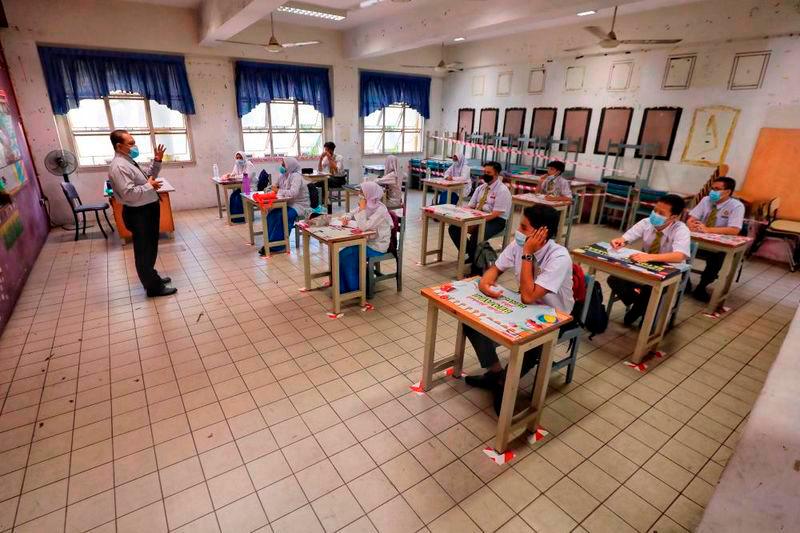Recently parents and those involved in education were concerned by the ranking given to Malaysia by the Organisation for Economic Co-operation and Development (OECD), where we are one of the top five countries with the steepest declines in reading, maths and science scores.
What has caused Malaysia to fall so badly in the rankings? Is there a missing link between teachers and students that needs to be cultivated such that, beyond just academic results, the connection is strengthened to foster productive relationship between student and teacher?
Is this connection important enough to influence the student’s ambition and motivation to improve their academic results?
Students who feel the engagement with teachers might then be motivated to do more and improve themselves.
Many educationists focus on academic results but the human connection is equally important.
I was reminded of my convent school days in Malacca where we continuously were in the bad books of the disciplined yet caring teachers, who made it a point to know each of us individually and track our progress. They seemed to know all our names and what our individual problems were, and for the poorer students efforts were made to reach out to their families, to provide free uniforms and books.
Even after we left school, during our class reunions, we would relate how we all suffered under their constant monitoring of our activities, especially skipping classes or not completing our homework.
What we all could agree on was the degree of care and friendship they offered us as we grew up and progressed to secondary school. There was Sister Alexis, always covered in flour and wearing an apron in domestic science classes and Sister Henry, our moral compass of behaviour, always advising us to concentrate on our studies and not keep company with ‘bad hats’, referring to the boys from neighbouring schools.
Through all of it, most of the ‘hardcore’ students, referring to ones who never paid attention and had myriad problems, eventually did their best and scored enough A’s to make it to sixth form and beyond.
So what was the reason behind their transformation?
Selva Mangudi, 63, was one of those who studied in Malacca High School (MHS) and today as a retired bank manager he spoke glowingly of his teacher, P. Poonenderajah, who taught him English and geography and recently passed away aged 87.
His legacy was not only that he was a teacher but he developed and nurtured many students into world-class hockey players who went on to represent the country, including, Olympians such as Koh Hock Seng (Tokyo, 1964) and Yang Siow Meng (Mexico City, 1968 and Munich, 1972).
“When I came to MHS in 1977, I joined Master Poonen’s hockey training sessions, and his aura and wisdom had a great influence on me. He was a giant of a man, not in stature but in his personality and how he treated each and every one of us. As a model teacher, he took his job seriously and the moral values he imparted stood the test of time.
“He drilled into all of us, work hard, study hard and play hard. Not only discipline, but the never-give-up attitude as well.
“He walked the talk from his dressing, his appearance and he instilled a us a need to treat hockey as a gentleman’s game, to have our hair neatly combed, to have our tee-shirt tucked in and to carry ourselves well during the game.
“He earned my utmost respect as he was the epitome of a real gentleman. He was never late for classes or training sessions and did not waste time on trivialities or frivolities, and time was of the essence and every minute counted,” said Selva.
Dato’ Freida Pilus, Founder of Cempaka International School in Damansara Heights, has achieved great success both academically, as well as in the field of performing arts and sports.
Cempaka Performing Arts Company (CPAC) was established in 2000 to manage the performing arts curriculum of Cempaka Schools.
In 2017, Cempaka was recognised by the Malaysian Book of Records for being the first school to stage an original musical at a professional level when producing Alice’s Wonderland by Cempaka Performing Arts Company.
According to Freida, her students experience a strong connection with teachers; they seem to love homework as well. School is all about exploration, discoveries and meaningful experiences. “In 1983, my family started the school and now it is like a big family sharing the same ideals of school and the true meaning of education in mind, body and soul.
“The teachers together with the parents work with the children to achieve success and this engagement also means there is teamwork,” said Freida.
What then has caused the overall relationship in schools to deteriorate?
Nallini Letchmanan has spent 36 years in the teaching industry, specifically at government schools, and she feels the emergence of social media has impacted students in a negative way.
Teachers are not the only source of information anymore and the respect has deteriorated, she observed. The friendship and bond is also missing and the distance grows between teachers and students.
“It is difficult to give one main reason for the loss of academic results but the government would need to examine if there is a missing link that once existed between teachers, students and parents that needs to be built for better communication and eventually better results.
The human aspect is important.”









